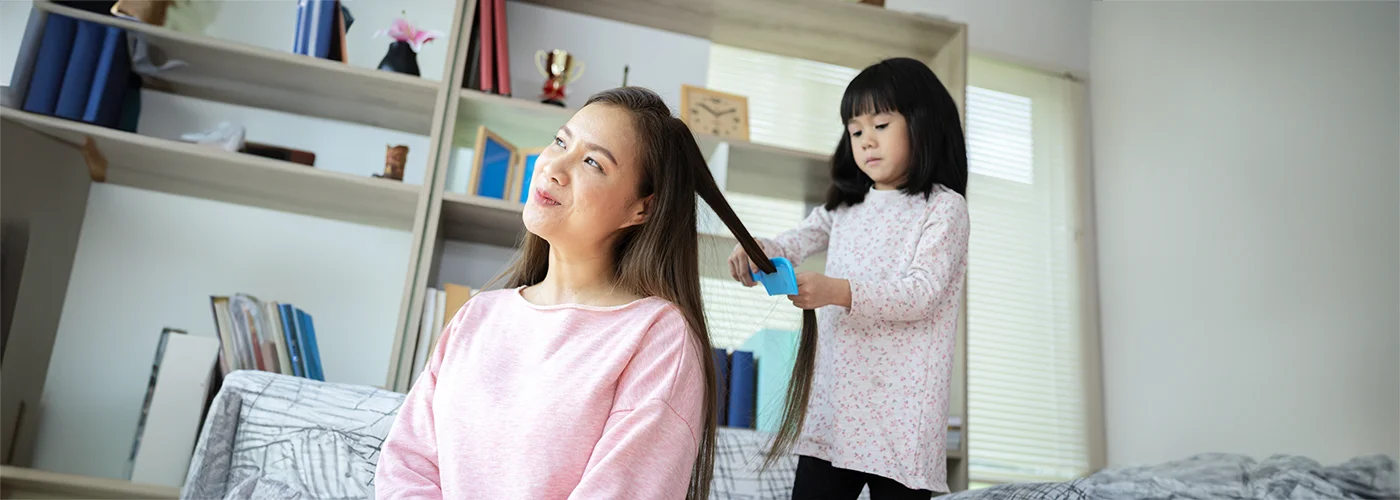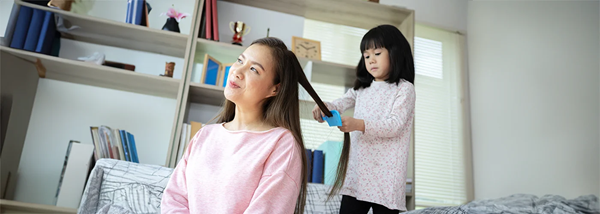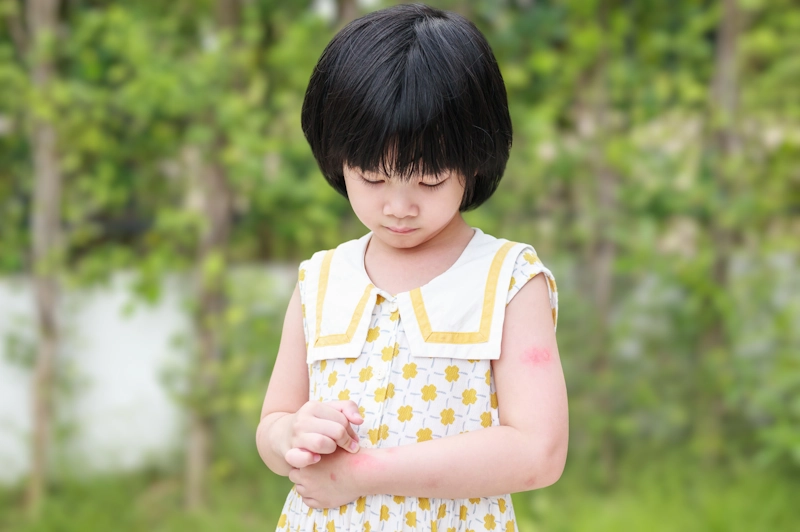Topics
Becoming a mother is a joyous occasion, but it often comes with a set of physical changes, including postpartum hair loss. Experiencing the onset of hair thinning a few weeks following the birth of your child can be an unwelcoming surprise.
You might notice strands of hair on your pillow and clothes, or your shower drain may become clogged with hair. This uptick in hair loss is natural and occurs due to hormonal fluctuations post-pregnancy.
What is postpartum hair loss?
Postpartum hair loss or postpartum alopecia is the excessive shedding of hair that can happen in the months following childbirth. It is a diffuse hair pattern loss, medically termed as Postpartum Telogen Effluvium (PPTE).
Typically occurring between three to four months post-delivery, postpartum hair loss is normal and temporary for most women. However, normal hair growth can resume within a year or so.
Why does postpartum hair loss occur?
The hormonal changes during pregnancy play a significant role in developing postpartum hair loss.
Higher amounts of oestrogen extend the development phase of hair during pregnancy, resulting in a thicker and glossier mane. However, oestrogen levels drop after delivery, and the hair cycle returns to normal. This change may result in more hair loss.
Some say that breastfeeding can cause hair loss. However, breastfeeding itself does not directly cause hair loss. Postpartum hair loss is primarily linked to hormonal changes rather than breastfeeding. Nevertheless, stress and nutrient demands associated with breastfeeding can indirectly contribute to hair loss if not managed properly.
When does postpartum hair loss begin?
Postpartum hair loss typically begins around three to four months after giving birth.
How long does postpartum hair loss last?
Postpartum hair loss typically lasts for about six to 12 months after giving birth. However, for some women, it may resolve sooner, while for others, it may persist for longer.
The duration and severity of postpartum hair loss can vary from person to person. It is essential to remember that this is a normal part of the postpartum period due to hormonal changes, and hair typically regrows once hormone levels stabilise.
How can I manage postpartum hair loss?
While postpartum hair loss is a natural process, there are steps you can take to manage it:
- Have a healthy, balanced diet: Nutrition plays a crucial role in hair health. Therefore, you should consume a diet rich in vitamins, minerals, and proteins. In addition, consuming foods high in biotin, Vitamin E, zinc, and iron can be beneficial for hair growth. Consult with your healthcare provider for personalised dietary recommendations.
- Scalp massage: Regularly massaging the scalp can help stimulate blood circulation, promote hair growth.
- Manage stress: While easier said than done, especially with a newborn, managing stress through relaxation techniques, adequate sleep, and self-care can positively impact hair health
- Use light conditioners: Heavy conditioners can weigh down your hair, making it look thinner. Choose lightweight, moisturising conditioners to avoid this issue.
- Be gentle with your hair: Handle your hair with care. Avoid excessive brushing or styling, as this can put extra stress on fragile postpartum hair. Use a wide-tooth comb to detangle and be gentle when towel-drying.
- Try different hairstyles: Experiment with hairstyles that can camouflage thinning areas or make your hair appear fuller. Consider shorter styles or adding layers for volume.
- Try not to use heat on your hair: Limit heated styling tools like straighteners and curling irons, as they can damage fragile postpartum hair. If you must use them, apply a heat-protectant product.
- Seek medical solution: While postpartum hair loss is harmless, if you notice excessive or prolonged shedding, it is advisable to consult a dermatologist. They can provide tailored treatments, rule out other underlying conditions such as thyroid disorder, that may contribute to hair loss.
Read more: Postpartum Care After Birth
Schedule an Appointment at Pantai Hospitals
Experiencing hair loss after giving birth can be a difficult journey for new mothers, but remember, that this is a normal and temporary phase.
If you are worried about postpartum hair loss, get in touch with us to schedule an appointment with our team of gynaecologists today for expert guidance and support, or find out more about our Obstetrics and Gynaecology Services at your nearest Pantai Hospital.
Pantai Hospitals have been accredited by the Malaysian Society for Quality in Health (MSQH) for its commitment to patient safety and service quality.













